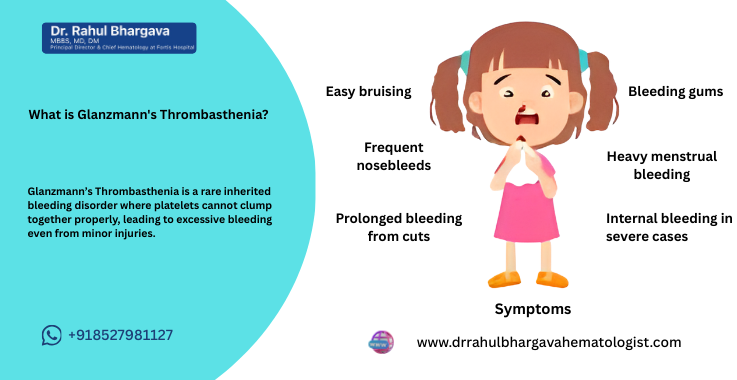Glanzmann's thrombasthenia Treatment in India

Glanzmann's Thrombasthenia (GT) is a rare genetic bleeding disorder that affects platelet function. It is characterized by a defect in the platelet glycoprotein IIb/IIIa complex, which is essential for platelet aggregation. This defect impairs the platelets' ability to bind to fibrinogen and other platelet receptors, leading to a failure to form effective platelet plugs at sites of injury and resulting in excessive bleeding.
Glanzmann's thrombasthenia is autosomal recessive, meaning that an individual must inherit two copies of the defective gene (one from each parent) to develop the disorder. It is usually diagnosed in infancy or early childhood due to recurrent bleeding episodes.
What is Glanzmann’s Thrombasthenia?
Glanzmann’s Thrombasthenia is an inherited disorder that affects the body’s ability to form blood clots due to abnormal or missing glycoproteins on platelets. This condition can lead to excessive bleeding, even from minor injuries.
Key facts:
- Rare bleeding disorder
- Genetic in nature
- Affects platelet function
Causes of Glanzmann’s Thrombasthenia
The main cause of Glanzmann’s Thrombasthenia is a mutation in the ITGA2B or ITGB3 genes. These genes are responsible for producing proteins that allow platelets to clump together to stop bleeding. When these proteins are missing or defective, clotting becomes impaired.
Key Causes:
- Genetic mutations
- Inherited as an autosomal recessive trait
- Both parents must carry the mutated gene
Types of Glanzmann’s Thrombasthenia
There are two main types of Glanzmann’s Thrombasthenia, classified based on the severity of symptoms and platelet function:
- Type 1: Severe form with almost no functional glycoprotein.
- Type 2: Milder form with some functional glycoproteins present.
Symptoms of Glanzmann’s Thrombasthenia
The symptoms of Glanzmann’s Thrombasthenia can vary from person to person but usually include excessive bleeding, even from minor injuries.
Common symptoms include:
- Easy bruising
- Frequent nosebleeds (epistaxis)
- Prolonged bleeding after injury or surgery
- Heavy menstrual periods (menorrhagia)
- Bleeding gums, especially after dental work
- Internal bleeding in severe cases
Diagnosis of Glanzmann’s Thrombasthenia
Diagnosing Glanzmann’s Thrombasthenia involves a thorough medical history, physical examination, and several blood tests. Dr. Rahul Bhargava may recommend:
- Platelet Aggregation Tests: To evaluate platelet function.
- Flow Cytometry: To assess the presence of specific glycoproteins on platelets.
- Genetic Testing: To confirm mutations in the ITGA2B or ITGB3 genes.
- Complete Blood Count (CBC): To check overall blood health and platelet levels.
Treatment for Glanzmann’s Thrombasthenia
While there is no cure for Glanzmann’s Thrombasthenia, several treatment options can help manage symptoms and prevent excessive bleeding. Dr. Rahul Bhargava tailors treatment plans based on the severity of the condition.
Treatment options include:
- Platelet transfusions: To control bleeding episodes.
- Recombinant factor VIIa (rFVIIa): A clotting agent to promote blood clotting.
- Antifibrinolytic medications: To prevent the breakdown of clots.
- Bone Marrow Transplant (BMT): A potential curative option in severe cases, especially for those with frequent bleeding episodes.
- Avoidance of aspirin or NSAIDs, Which can further impair platelet function.
Cost of Treatment and Stay in India
The cost of treating Glanzmann’s Thrombasthenia in India is relatively affordable compared to many Western countries, making it an attractive destination for medical treatment. The total cost of treatment, including hospital stay, can vary depending on the severity of the condition, the specific treatments required, and the duration of care.
-
Platelet Transfusions (per session):
USD: $100 – $500
INR: ₹7,400 – ₹37,000 -
Recombinant Factor VIIa (rFVIIa) Therapy (per dose):
USD: $500 – $2,000
INR: ₹37,000 – ₹1,50,000 -
Antifibrinolytic Medications (per month):
USD: $100 – $500
INR: ₹7,400 – ₹37,000 -
Bone Marrow Transplant (BMT):
USD: $20,000 – $50,000
INR: ₹15,00,000 – ₹37,00,000 -
Hospital Stay (per night):
USD: $30 – $200
INR: ₹2,200 – ₹15,000
India’s healthcare system offers high-quality treatment options for Glanzmann’s Thrombasthenia at a fraction of the cost compared to Western countries, with skilled specialists and modern medical facilities. The costs are significantly lower while still providing excellent care and management for this rare bleeding disorder.
Frequently Asked Questions
There is no definitive cure for Glanzmann’s Thrombasthenia, but treatments like platelet transfusions and bone marrow transplants can effectively manage symptoms and reduce bleeding risks.
While the condition can lead to serious bleeding complications, with proper management and timely treatment, many individuals can lead normal lives.
The disorder is passed down in an autosomal recessive manner, meaning both parents must carry the gene mutation for a child to be affected.